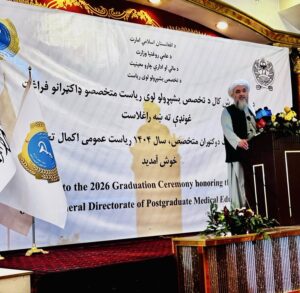GHAZNI CITY (SW) – In less than six months of the current solar year, residents of Ghazni have embarked on the construction of at least 10 schools and more than 20 religious schools in the province’s center and districts.
Mia Gul Sediq, Director of Publications at the Ghazni Department of Education, stated that these schools and religious institutions are being built with a total expenditure of over 45 million afghanis, funded by local residents. Siddiq further mentioned that by the end of the current solar year, 25 schools are expected to be constructed or renovated with support from the United Nations Children’s Fund (UNICEF) and an additional 25 schools will be funded by the Ghazni Department of Education.
He added: “In the districts of Qarabagh, Moqor, Khwaja Omari, Zana Khan, Jaghori, Daykundi, and the center of the province, approximately 75 acres of land have been allocated for the construction of schools. The Ghazni Department of Education is set to build 25 more schools.”
Aref Nazari, a representative from the Jaghori district, who has recently initiated the construction of a school funded by the local community, noted that the shortage of schools has prompted residents to take this action. “There are philanthropic individuals both within and outside the region who are contributing. Coordination has been done to ensure these schools are built. The community is pleased that their school is being constructed.”
Sayed Bismillah, a teacher in Ghazni, stated that community-led school construction could address some of the educational challenges in the province and positively impact students’ motivation. “Our issue was the lack of classrooms and organized educational spaces; hence, we want to rebuild schools. Discussions have been held, and they are expected to be built to standard specifications.”
Ali Maysam, an eighth-grade student from the Shaki Valley in the Jaghori district, expressed his happiness about the community’s efforts to build a new school. “We are happy that our school is being built. Our classroom lacked windows, desks, and chairs, and we faced many difficulties.”
Meanwhile, Mir Nasir Ahmad Hussaini, Director of Education in Ghazni, told Salam Watandar that the province’s residents are significantly involved in the construction of schools due to their recognition of the importance of education. He added: “The people of this province understand the importance of collaboration, and in all districts of Ghazni, except for one, traders and philanthropists are cooperating with us in building schools.”
The shortage of schools, educational materials, and qualified teachers has been a major challenge for Afghanistan’s education system. In recent years, citizens in various provinces, as well as external aid organizations, have worked alongside the Ministry of Education to address these issues.






